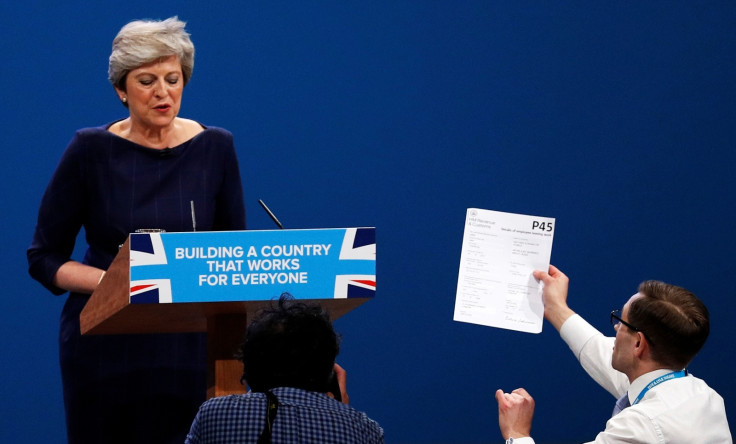Theresa May's speech was awful – and not just because of the bizarre disasters
Policy is more important than performance and the Tory leader failed on both counts.
In Britain we need millions of new houses yet the chances of getting them any time soon remain slim. This is true despite the enthusiasm on the part of some who hoped the prime minister was about to announce a large housebuilding programme in her Conservative party conference speech.
As it turned out, Theresa May's proposals entail the building of 25,000 new 'affordable' homes - itself an ambiguous term - over five years. In other words, 5,000 new homes a year.
This is of a piece with other announcements made by May over the past year. The briefings promise a great deal, but the substance is about as exciting as slice of stale toast. Aside from the insubstantial promise to build a few more homes, in her speech May also proposed an energy price cap similar to that mooted by Ed Miliband four years ago, and a switch to opt-out for organ donation.
The most consequential of these will I suspect be the policy on organ donation which, while long overdue, says something about the paucity of May's ambition.
Considering May's track record of promising things and not delivering them - workers on boards, more rights for those in the gig economy, hard Brexit? - it seems a stretch to expect her to deliver even on the meagre offerings announced on 4 October.
Of course, May's speech will mainly be remembered for the series of bizarre disasters that unfolded as she stood behind the lectern. First, the prankster Simon Brodkin - aka Lee Nelson - interrupted the speech and handed her a P45. Then the prime minister's voice lost any resonant confidence it might have possessed and, amidst the sympathetic attempt by the audience to revive their leader with whooping and applause, it collapsed into a gravel-like scratch. This went on for about 10 minutes as Tory members squirmed and grimaced in their seats. Then the lettering – spelling out "a country that works for everyone" - began to peel and drop off the back wall.
More importance than is warranted is usually attached by journalists to the aesthetics of speeches such as this one. When May's leadership is retrospectively mulled over and its epitaph drawn up by journalists, I expect this to be one of several moments that will be held up as definitive turning points. It was here, in Manchester, that the writing was on the wall (in this case it literally fell off the wall) in terms of the May premiership.
And May's disastrous speech certainly feeds into a larger narrative that I suspect the prime minister will find it near enough impossible to overcome.

Watching the Daily Politics when the prime minister's speech was over, one of the guests remarked that she felt "desperately sorry" for Theresa May. There is of course nothing unusual in that – I suspect most of us did at some point during the speech. Who has never had some terrifying vision or nightmare about freezing up, or losing one's faculties, in front of a large audience of people?
Yet the entire point of leadership is that you are not an ordinary human being. Just as the old Machiavellian axiom dictates that it is better to be feared than loved, so common-sense says that the evocation of pity on the part of a leader is nearly always fatal.
On one level, charismatic leadership is about making an audience fall collectively in love with you. Theresa May has never claimed to be charismatic, but no one falls in love with someone because they feel sorry for them.
Yet for all that, it is boring old material factors that will ultimately undermine the Conservative party more than any botched conference speech. The lack of ambition on display on the speech exists against a backdrop of stagnant incomes, spiralling debt and the dream of owning a home moving further out of the reach of young voters.
May, in contrast, lamented those who "say free markets are holding people back". This seems rather surreal when two-fifths of the public have no assets to their names at all. The share of first-time buyers who receive assistance from the so-called 'bank of mum and dad' has risen to a record high of 34% in recent years.
Meanwhile, many of the 'record' new jobs created since the recession are precarious and poorly paid. If this is not a failure of the free market, where on earth does May believe the problem lies?
In truth, the prime minister is unable to do anything substantive about Britain's looming problems because, like previous Tory leaders, she is wedded religiously to the notion that the free market produces a just order all by itself.
And it is the substance of her conference speech – or the lack of it – that will do for the Tories more than any uncomfortable coughing fit.
James Bloodworth is former editor of Left Foot Forward, one of the UK's top political blogs, and the author of The Myth of Meritocracy.
© Copyright IBTimes 2025. All rights reserved.






















